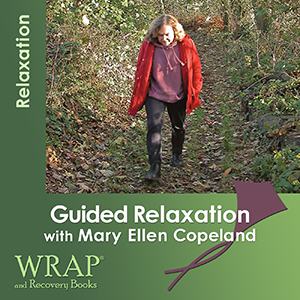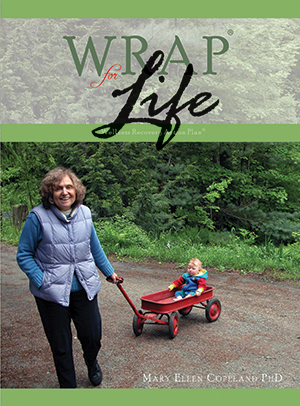Your Wellness Toolbox, the cornerstone of your WRAP, is a list of tools you use to help yourself feel better and to stay well. This article addresses having tools for especially difficult and unexpected situations. I have them in the When Things are Breaking Down (Avoiding a Crisis) section of my WRAP.
 I have been hearing from lots of people who are trying to figure out Wellness Tools that they can use in the hardest of times – times when it is really hard to access anything you can use outside of yourself, when you don’t have access to or can’t use any physical “prop” like a pen, a computer, a television, a book or even a special place. For example, I once suddenly found myself in the intensive care unit of the hospital connected to various tubes and machines that made intermittent noises.
I have been hearing from lots of people who are trying to figure out Wellness Tools that they can use in the hardest of times – times when it is really hard to access anything you can use outside of yourself, when you don’t have access to or can’t use any physical “prop” like a pen, a computer, a television, a book or even a special place. For example, I once suddenly found myself in the intensive care unit of the hospital connected to various tubes and machines that made intermittent noises.
You might be in jail or prison. You might find yourself marooned on public transportation that has broken down. Or perhaps you have lost your living space and all your belongings. You may be in a war situation or in a place where there has been a disaster. I would consider this the “When Things are Breaking Down” or the “Avoiding a Crisis” section of my WRAP. It is incredibly challenging and it can’t be anticipated. We never know when we are going to find ourselves in a situation like this.
I think that, without “catastrophizing” (spending a lot of time thinking of the worst things that could possibly happen), we need to plan for these times that we hope will never happen by having some tools in our Wellness Toolbox that we can have ready if they do happen. I have spent a lot of time considering this, thought about what I did when I was in this situation, and have reached out to others for ideas.
When I was in this situation, where I was in a hospital bed, scared, and couldn’t move, I:
- Studied a tree and the view outside the window–in detail
- Progressively tightened and relaxed parts of my body starting with my toes
- Focused all my attention on one part of my body I usually ignore, like the inside of my mouth, my elbow or the back of my knee for a few minutes
- Went over and over in my mind simple poems that I learned by heart when I was a kid
- Once I learned the presidents of the United States in order from George Washington on–and so I reviewed those over and over and over–I did them backwards too (I have tried to learn the wives first names but I haven’t mastered that yet)
- I tried to remember the names of all the states of the United States and their capitals–then I tried to alphabetize them in my head
- I thought of all the things I love about my life
- I thought about all the people I love
- I thought about my favorite places
A friend who was incarcerated in solitary for a time with nothing to read and nothing to write with said that he:
- Spent a lot of time pacing
- Counted steps so he walked at least mile a day
- Would sing
- Talked to other people as much possible, whenever possible
- Counted in other languages
- Reviewed words that he knew in other languages
- Meditated (had a specific chanting meditation that he used a lot)
Following are some other Wellness Tools for these times that people shared with me on Facebook:
- Meditate
- Pray
- Focus your attention on your breathing, change how you breathe and notice how it makes you feel
- Read
- Talk to a friend
- Listen to music or make music
- Sing
- Listen to birds
- Observe nature
- Play various mind stimulation games
- Remember jokes–if there is someone to share them with, share them
- Relive in your mind wonderful times in your life
- Think about beautiful or special things you have done
- Write a poem in your mind–and on paper if you can
- List in your mind all the things that are wonderful about you, and about someone you love
If you have other ideas, please send them to me via social@MentalHealthRecovery.com so I can share them with others. Also, please send your experience of using these tools in these times. Thanks.
Looking for More Information on Wellness Tools? Check Out these Great Resources:




Mary Ellen Copeland, PhD, developed Wellness Recovery Action Plan (WRAP) with a group of people with lived experience who were attending a mental health recovery workshop in 1997. She is the original author of the WRAP Red Book, as well as dozens of other WRAP books and materials. She has dedicated the last 30 years of her life to learning from people who have mental health issues; discovering the simple, safe, non-invasive ways they get well, stay well, and move forward in their lives; and then sharing what she has learned with others through keynote addresses, trainings, and the development of books, curriculums, and other resources. Now that she is retired, and that, as she intended, others are continuing to share what she has learned, she continues to learn from those who have mental health issues and those who support them. She is a frequent contributor to this site.





